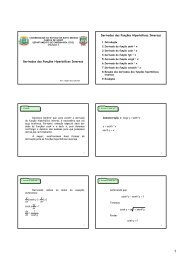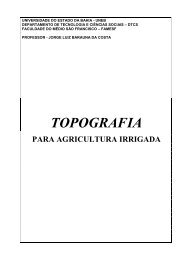Anuário Brasileiro do Arroz 2011 - Unemat
Anuário Brasileiro do Arroz 2011 - Unemat
Anuário Brasileiro do Arroz 2011 - Unemat
Create successful ePaper yourself
Turn your PDF publications into a flip-book with our unique Google optimized e-Paper software.
42<br />
Overload<br />
Tax exemption gets onto the rice agenda, seeing<br />
that taxation impairs <strong>do</strong>mestic sales of the cereal<br />
The fiscal war between Brazilian States<br />
is one of the factors that make our national<br />
rice more expensive than imported<br />
rice in the <strong>do</strong>mestic market. As upwards of<br />
73% of the cereal is produced in the two<br />
southernmost states of Brazil, excessive<br />
taxation weakens the competitive edge of<br />
the southern product, particularly, if compared<br />
to rice from Argentina and Uruguay.<br />
In 2010, the production chain in Rio<br />
Grande <strong>do</strong> Sul started to exert pressure,<br />
in a very orderly manner, asking for tax<br />
exemption to the cereal. But, if for one<br />
thing, this technically translates into lower<br />
prices at consumer level and lower<br />
production costs, on the other hand, it<br />
would affect national tax collection interests<br />
and the interests of the major rice<br />
producing States. There lies the big hurdle<br />
of the proposal, reason for countless debates<br />
and dissentions among States, production<br />
chain and even federal government<br />
interests. As nobody wants to forgo the<br />
collection of taxes, this impasse is leaving<br />
no chance for a definite solution, which<br />
could come from the Fiscal Reform Bill,<br />
now being debated in Congress, but entry<br />
into force has not been scheduled yet.<br />
“The demand for tax reductions has<br />
come a long way, and so have the debates.<br />
But it affects the coffers of State and<br />
Federal governments, none of them willing<br />
to give up tax revenues, and no solution is<br />
in sight. With the commercialization crisis,<br />
the issue surfaced in earnest. This time we<br />
expect for results”, stated André Barretto,<br />
president of the Brazilian Rice Industries’<br />
Association (Abiarroz) and of the Federation<br />
of Rice Cooperatives in Rio Grande <strong>do</strong><br />
Sul (Fearroz).<br />
According to him, the issue is being<br />
debated both in the national and state<br />
sectorial chambers. There are bills waiting<br />
to be voted into law at the State Legislative<br />
Assembly and in Congress. “In a<br />
Fiscal Reform, the question of the ICMS<br />
(state value added tax) is a core issue in<br />
the debates. It has to be addressed. The<br />
problem is to find politicians willing to<br />
carry on with a reform of such relevance,<br />
since there are conflicting interests”, he<br />
stresses. He recalls that the most penalized<br />
state by the tax burden is exactly the<br />
biggest producer of the cereal. “As in most<br />
other states the crop is not very relevant<br />
in terms of GDP (Gross Domestic Product),<br />
the governments levy lower taxes on the<br />
product, especially lower ICMS taxes”, Barretto<br />
ponders.<br />
OPPOSITE DIRECTION The tax<br />
situation in Brazil is so discrepant that<br />
the price of rice shipped from Rio Grande<br />
<strong>do</strong> Sul to other states is on a par with<br />
the price of rice from other countries, on<br />
which the Common External Tariff (CET)<br />
is levied - a kind of tariff barrier on products<br />
that come from abroad. In the case<br />
of Rio Grande <strong>do</strong> Sul, the barrier goes by<br />
the names of ICMS, Social Integration<br />
Program fees and Contribution for the Financing<br />
of Social Security (PIS/Cofins),<br />
Rural Workers’ Assistant Fund (Funrural),<br />
Rio Grande <strong>do</strong> Sul Rice Farming Defense<br />
and Cooperation Fee RS (CDO), Additional<br />
Fee for the Renewal of the Mercantile<br />
Marine (AFRMM) and others.<br />
The “Price Markup”, for taxation purposes,<br />
may exceed 10%, according to studies,<br />
just on processed rice – within the<br />
farm gate it would represent upwards of<br />
15% of the production cost. “At present,<br />
Rio Grande <strong>do</strong> Sul faces more difficulties<br />
selling to other States than the Mercosur<br />
countries and gets on a par, to its disadvantage<br />
in many cases, with the United<br />
States, Vietnam and Thailand”, says Tiago<br />
Sarmento Barata, analyst with Agrotendências<br />
Consultoria em Agronegócios.<br />
According to the analyst, processed rice<br />
from Rio Grande <strong>do</strong> Sul may reach the town<br />
of Recife (PE) with a per-ton price US$ 100<br />
higher compared to the similar product<br />
from Montevideo (Uruguay). In Barata’s<br />
view, Rio Grande <strong>do</strong> Sul levies ICMS taxes<br />
from 7% to 12% on processed rice that is<br />
Robispierre Giuliani<br />
shipped to other states, and could overcome<br />
the prejudice of tax renouncement. “It<br />
would mean one step backward and then<br />
two steps forward”, he ponders.<br />
With well structured planning, in the<br />
opinion of the analyst, the State could<br />
even expand its tax collection revenues by<br />
reducing the tax impact on rice, by virtue<br />
of higher processing volumes and soaring<br />
industrial transactions by the industries<br />
of Rio Grande <strong>do</strong> Sul. He mentions that,<br />
after generating an average of 420 new<br />
jobs a year, in 2010 the industry of the<br />
sector generated only one. “A reduction<br />
to the tax burden represents more processing,<br />
jobs and income. And in the least<br />
developed region in Rio Grande <strong>do</strong> Sul,<br />
where the economy is much dependant<br />
on rice. A crisis like this one affects all<br />
the segments, as a whole, throughout<br />
the State”, he explains.<br />
FOCUSED Study ordered by the Rio<br />
Grande <strong>do</strong> Sul Rice Institute (Irga) from<br />
the Institute for the Study of Trade and<br />
International Negotiations (Icone) showed<br />
that, in 2010, 9.89% tax was levied<br />
on a 30-kg bale of white rice, traded for<br />
R$ 37.38. This percentage is the sum of<br />
the federal (2.19%), state (7.57%) and<br />
municipal (0.13%) taxes, representing<br />
R$ 3.70 in the composition of the final<br />
value of industry net sales.<br />
The ICMS, state value added value,<br />
represents the biggest share, accounting<br />
for 7.48% or R$ 2.80 over the industry<br />
sales price to the <strong>do</strong>mestic market.<br />
In case of shipments abroad, taxation<br />
is not that heavy, but still eligible for<br />
the exemption of some taxes. The chief<br />
executive officer at the Icone institute,<br />
André Nassar, mentions that the study<br />
is being detailed in conjunction with the<br />
production chain. Anyway, leaving out<br />
the ICMS, only a few taxes remain to be<br />
removed and their share might not be<br />
as relevant in light of the commitment<br />
brought about by the state tax.


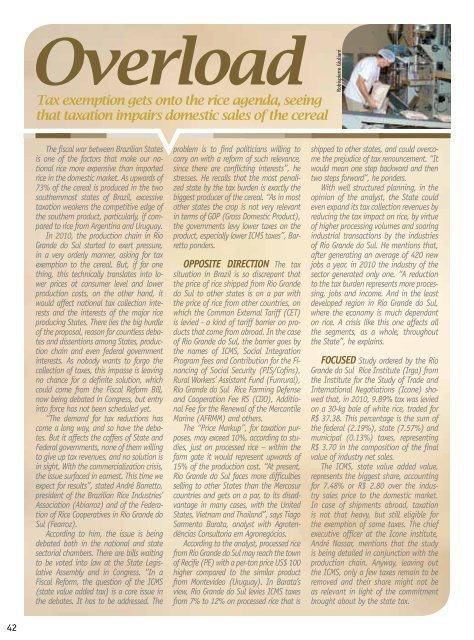
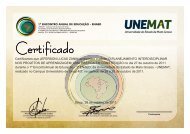
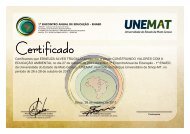
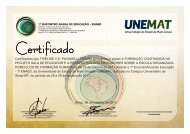
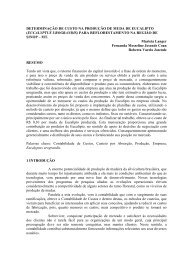
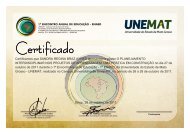
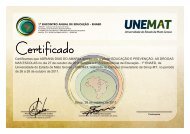
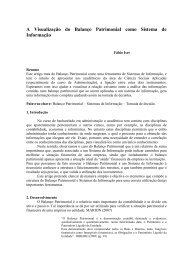
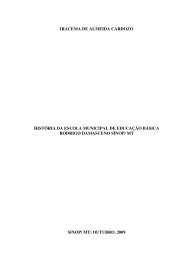
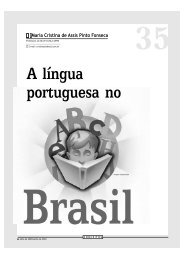
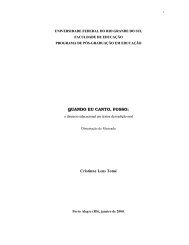
![Aula 31 - Funções Hiperbólicas [Modo de Compatibilidade] - Unemat](https://img.yumpu.com/14334654/1/184x260/aula-31-funcoes-hiperbolicas-modo-de-compatibilidade-unemat.jpg?quality=85)
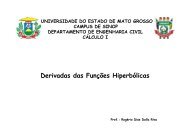
![Aula 31 - Funções Hiperbólicas [Modo de Compatibilidade] - Unemat](https://img.yumpu.com/14332146/1/190x135/aula-31-funcoes-hiperbolicas-modo-de-compatibilidade-unemat.jpg?quality=85)
